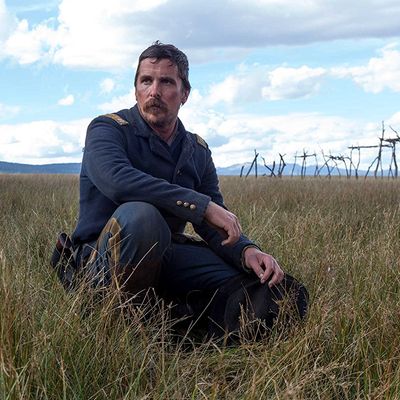
The American West of Hostiles is depressed. Early in the film, Captain Joseph Blocker (Christian Bale) sits down for a nightcap with his second-in-command, Metz (Rory Cochrane), who tells him that he “has the melancholia” and may have to quit the military. From the look of him: slumped, mumbling, booze-soaked, we have no reason not to believe him. But Joe insists he’s fine; such a condition doesn’t even exist. The film proves him wrong over its hefty run time: By the end of the film not only are we more than certain that melancholia is real, but we’re pretty sure we’ve caught it too, and that it is inextricable from the very soil of this country. All this is pretty apparent about an hour out from the end credits, but nevertheless director Scott Cooper (Black Mass, Crazy Heart) presses on, his parade of endemic violence dragging by as slowly as humanly possible.
The year is 1892, which we realize with a start isn’t all that long ago for the foundation of Maslow’s hierarchy of needs to be so shaky in our proud republic. The conflict between the Native tribes of New Mexico and the Union settlers is being solved mostly via murder and mass imprisonment of the former. When Joe gets an assignment to transport one such prisoner, a chief named Yellow Hawk, back to his native land in Montana with his family, he looks close to nauseated with rage, and it’s not just his hangover. Yellow Hawk murdered several of his friends a while back; it’s all he can do every day not to kill him in his paddock in revenge. Bale is exceedingly well-cast as a man who holds onto his anger like a security blanket, who has become a junkie for violence.
More questionably cast is Rosamund Pike as Rosalie Quaid, a traumatized widow whom Joe and his crew encounter en route to Montana. Pike made a name for herself as Amazing Amy Dunne in 2014’s Gone Girl as a fraudster, and it’s been hard for me to believe her in any subsequent performance. She’s uniquely ridiculous here, a collection of post-traumatic damaged-woman tics in lieu of a character, flailing her body and wailing as she digs the graves for her children by hand. She’s taken in by the party and makes the journey with them, and her needs and tics are attended to with far more understanding than that of the Natives. The film is inevitably plodding toward a third act in which the hypocrisy of this is laid bare and Joe finds redemption, but there is much more quaking and keening to get through before we get there.
Hostiles is a brutal if well-intentioned film that doesn’t help its cause with its lack of development of its Native characters. The depression of its West is only articulated through its white characters, just as mental illness at large is still mostly just a subject for white film characters to struggle through. It does this well enough, but how many more nouveau Westerns will we have to slog through until the trauma of white male violence on white males is fully excavated and picked through, and we can finally move on to how it affected everyone else?

